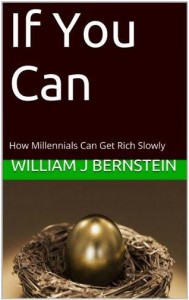William J. Bernstein is an American investment adviser and financial theorist whose bestselling books include The Birth of Plenty and A Splendid Exchange. His most recent book, Rational Expectations: Asset Allocation for Investing Adults, was recently reviewed in The Economist. He is a principal in the money management firm Efficient Frontier Advisors, a frequent guest columnist for Morningstar, and is often quoted in The Wall Street Journal.
Bernstein has given permission for Cuffelinks to provide a complete copy of his 2014 booklet, ‘If You Can: How Millennials Can Get Rich Slowly’. It is his simple recipe for young people starting on an investing journey. It is linked here:
If You Can: How Millennials Can Get Rich Slowly

Copy this link or use the ‘Share/Save’ button above the article to forward to someone.
Bernstein’s introduction to the booklet is:
“For years I've thought about an eleemosynary project to help today's young people invest for retirement because, frankly, there's still hope for them, unlike for most of their Boomer parents. All they'll have to do is to put away 15% of their salaries into a low-cost target fund or a simple three-fund index allocation for 30 to 40 years. Which is pretty much the same as saying that if someone exercises and eats a lot less, he'll lose 30 pounds. Simple, but not easy … The booklet will take only an hour or two to read, it's not a complete solution. It's a roadmap, a pointer in the right direction.”
Bernstein identifies five hurdles to overcome to retire successfully:
- People spend too much money. If you can't save, you'll die poor
- You need an adequate understanding of finance and markets
- Don’t ignore financial history
- Know yourself. Your biggest enemy is yourself
- Exercise care in dealing with the financial services industry.
A few notes for an Australian audience:
- Bernstein talks about retirement vehicles in the US called 401 (k) plans or IRAs (Individual Retirement Accounts). The equivalent in Australia is a person’s superannuation fund account, into which concessional or non-concessional contributions can be made (subject to limits). However, if a young person is saving for a deposit on a house, they need to be aware of the lack of access to superannuation, and consider saving outside superannuation with different tax consequences.
- Bernstein identifies three different types of funds, but these apply for Americans. An Australian choosing the same funds would have a foreign exchange risk. Possible substitutes are:
- An S&P/ASX index fund instead of a US total stock index fund
- An Australian bond fund instead of a US total bond index fund
- An Australian investor could choose a unit trust, a Listed Investment Company or an ETF depending on their own preference or experience. Following Bernstein’s paper, the third fund would be a global equity fund.
Some comments on Cuffelinks’ perspective
As with all the articles we publish, we are sharing ideas and opinions, but it does not mean we agree with everything. For example, Bernstein is a believer in using index funds and not investing directly or using a broker or a fund manager. While Cuffelinks accepts the merits of index funds, especially for novice investors who cannot identify good stocks or managers, we do not promote one method of investing over another. An investor who believes talented fund managers can be identified should back their judgement, and there is a place for the experienced investor to go direct. We also believe there is an important role for financial advisers to play.
However, we do think Bernstein offers a good introductory text and has many useful ideas worth sharing, including:
“If I had to summarize finance in one sentence, it would go something like this: if you want high returns, you’re going to occasionally have to endure ferocious losses with equanimity, and if you want safety, you’re going to have to endure low returns.”
We welcome your opinion on Bernstein in our comments section.
This article and the attached booklet are general in nature and readers should seek their own professional advice before making any financial decisions.